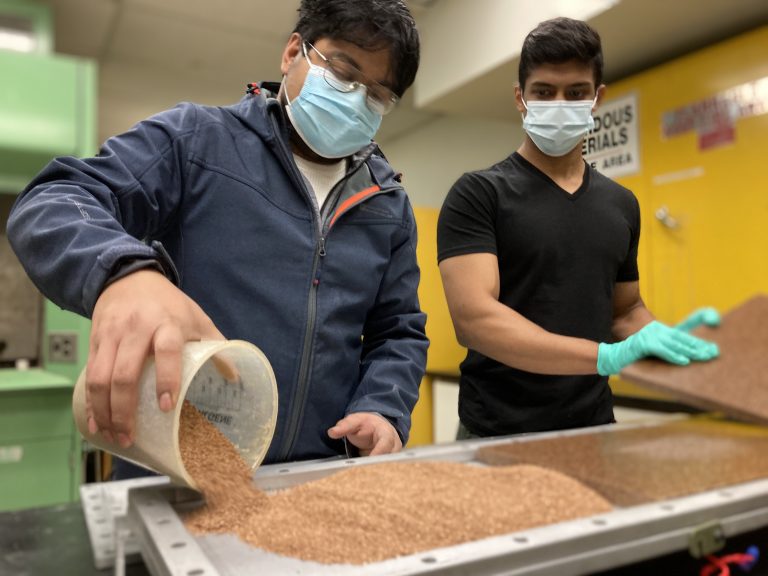
Jan 17, 2022Hazelnut shells get new life as strong, sustainable panels
Harvest a hazelnut, and you’re left with a shell.
These hard, thin, slow-decaying husks are typically mulched or discarded, but Washington State University scientist Vikram Yadama has found a new way to upcyle leftover hazelnut shells into durable panels for cabinets, tables, and other products.
At Washington State University’s (WSU) Composite Materials Engineering Center, Yadama and a team of doctoral students turn agricultural waste products, such as shells, fibers, and stubble, into resin-strengthened architectural and decorative panels.
Part of WSU Extension, Yadama collaborates with manufacturers to share ideas and create new techniques. Funded by the National Institute for Food and Agriculture’s Small Business Innovation Research Program and inspired by a Northwest client seeking help making compressed fiber panels, his latest project explores hazelnut shells as an ideal main ingredient.
“When you make panels for tables or cabinets, a few things become really important,” Yadama said.
Panels need to be strong enough to bear a load across a given span. They need to be able to hold screws or fasteners, and to have minimal creep, or bending over time due to weight.
“The foremost thing is that the look has to be phenomenal,” Yadama said.
Ingredients determine performance, and Yadama experiments with a range of natural materials, such as hemp and sorghum fibers or wheat stubble. Some materials have long structural fibers called bast. Inside is a pithy, crumbly material called hurd. Structurally, bast and hurd perform differently in a panel.
Hazelnut shells are naturally sustainable, and offer a promising mix of strength, performance, and beauty, bringing a rich reddish-brown color to Yadama’s prototype panels.
“Shells, wood, and natural fibers have a lot of carbon in them,” he said. “When you stop them from degrading, you trap the release of carbon. If we can keep material from going to the landfill, and at the same time keep growing more trees, this cycle will help us in the long run.”
The team is working to maximize the amount natural fiber in the panel while minimizing the amount of resin, and ultimately envision use of a bio-based, carbon-neutral resin.
“This project is really exciting and intriguing, because it upcycles an industrial waste product, reduces environmental burden, and is industry-oriented and relevant to what’s required in the commercial world,” said Avishek Chanda, postdoctoral researcher in Yadama’s lab.
“More fibers per panel means they’re more biodegradable, cost-friendly, and valuable with minimal resin usage,” Chanda added. If the team can maintain that standard at the industrial scale and fabricate eight-by-four-foot panels with a high-volume fraction of fiber, “it’s a very big achievement.”
Aiming to complete the project this winter, Yadama is developing both a product as well as prototype equipment that can be scaled up to the commercial scale. If successful, one day soon consumers may sip hazelnut-flavored coffee at a table or in a chair made from a nutshell.
“It has been an amazing experience working with our partners on development of these new hazelnut shell panels,” Yadama said. “Clients in the architecture and design industry are excited by the prototypes we’ve shown, and we expect this new material type will be a huge success once it’s ready to manufacture.”
Postdoctoral researcher Avishek Chanda, left, and doctoral student Vyasgowtham Prabhakar, right, demonstrate part of the process of turning hazelnut shells into strong, eye-catching architectural panels. Shells are packed into a mold, left, and infused with resin. The team is working to increase the fiber content and maintain the required structural standards while scaling up to commercial-sized panels. Photo: WSU







